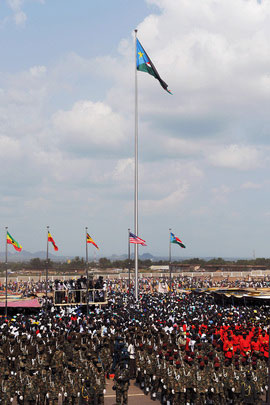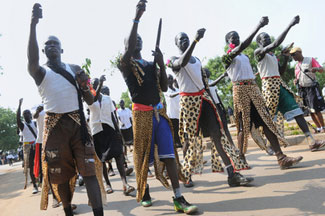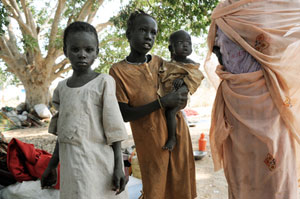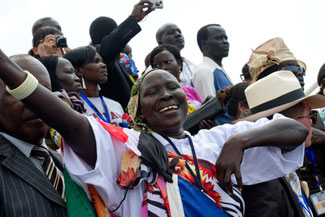August, 2011

The final steps to an independent state

The flag of the Republic of South Sudan is raised high during the Independence Ceremony on July 9. Picture credit: UNITED NATIONS
(This article by Paul Jimbo was written just before South Sudan's independence on 9 July.)
Juba, the capital city of the world’s newest nation, the Republic of South Sudan, has spent the months leading to its independence celebrations undergoing a $60m facelift.
Flowers have been planted along the main streets and celebratory banners hang across the city. Previously, the only decoration in this dusty town of ramshackle huts and shacks came from trees whose trunks were painted a fading white, in contrast to green leaves, to represent the colours of the South’s army, the Sudanese People’s Liberation Army, (SPLA).
A clocktower, stationed in downtown Juba, acts as a stop watch, counting down the hours, minutes and seconds to independence, while the streets are being sprayed with water daily to keep the billowing dust at bay.

To many Southerners, independence day will be the climax of the 2005 signed pact between the North and South that ended a civil war which killed about two million people within a span of 21 years.
Few would dispute the fact that Juba needed a make-over. The war-damaged city of tin-shack housing and dirt roads was left in ruins by decades of fighting.
However, some argue the money could have been better spent.
Peter Abdelrahman Sule, the chairman of the Opposition party, United Democratic Front (UDF), says a lot of fears remain over South Sudan’s future and its capacity to govern itself.
“I am worried that we are beginning on a wrong footing with all this tribalism, nepotism and greed. People want to amass wealth quickly yet we have extremely poor people who are the majority in this region,” he said.
“When you see almost every government official driving fuel guzzlers I can tell you something is wrong with our leadership. We are forgetting that we have poor people in the rural areas who do not even have food. We lack basic health infrastructure, we lack schools and even clean drinking water.”
There is a growing division of wealth in Juba, with two distinct groups of people: a rich elite and the majority who are extremely poor.

For the rest, life is very different. Food prices have doubled since January this year and almost non-existent infrastructure and decades of war have made Juba one of the most expensive cities in the world. In the market two or three tomatoes can be as much as $1 while a kilogram of beef costs $10.
Elderly people line the streets to beg and homeless families scavenge for food in rubbish dumps.
As part of the beautification process, in March the government bulldozed hundreds of shacks in informal settlements, which doubled as markets and homes. The demolitions left hundreds of families homeless and angry.
John Ladu, 24, a casual worker at a mineral water processing factory, lived in Juba’s Hai Cinema district, before his home was demolished.
“Nobody is providing alternative places for the displaced to live,” he said. “Is this what we call self governance?”
Major General Gier Chuang Aluong, Minister of Internal Affairs in the southern government, defended the facelift programme.
“Juba is a young town and unless we control its development plans, we might end up with slum city,” he said. “Our main intention here is to ensure there are proper ways of doing things. We cannot just allow everyone to put up a structure wherever he likes, we must have an order of doing things.”
Some of the poor have been able to find work thanks to the current building boom, which has seen the construction of Juba’s first supermarket, the presidential palace and major banks and hotels. Stone-breakers can earn up to $35 dollars on a good day, supplying stone to the construction industry.
However, for now the residents of Juba are gearing up for a long-awaited party.

Once the party is over Juba’s residents will face the challenges that lie ahead.
This is part of an article that appeared in http://panos.org.uk. The original article can be found at http://panos.org.uk/features/south-sudan-takes-final-steps-to-statehood/.
Juba, the capital city of the world’s newest nation, the Republic of South Sudan, has spent the months leading to its independence celebrations undergoing a $60m facelift.
Flowers have been planted along the main streets and celebratory banners hang across the city. Previously, the only decoration in this dusty town of ramshackle huts and shacks came from trees whose trunks were painted a fading white, in contrast to green leaves, to represent the colours of the South’s army, the Sudanese People’s Liberation Army, (SPLA).
A clocktower, stationed in downtown Juba, acts as a stop watch, counting down the hours, minutes and seconds to independence, while the streets are being sprayed with water daily to keep the billowing dust at bay.

Dancers practice, as South Sudan rehearses for the big day.
Picture credit: UNITED NATIONS
In the last few weeks potholes have been fixed, trees trimmed, streets swept and fences painted. The streets have been cleared, and the local motorbike taxis, or boda-bodas, banned, so VVIP convoys can speed their way through the town.
Picture credit: UNITED NATIONS
To many Southerners, independence day will be the climax of the 2005 signed pact between the North and South that ended a civil war which killed about two million people within a span of 21 years.
Few would dispute the fact that Juba needed a make-over. The war-damaged city of tin-shack housing and dirt roads was left in ruins by decades of fighting.
However, some argue the money could have been better spent.
Peter Abdelrahman Sule, the chairman of the Opposition party, United Democratic Front (UDF), says a lot of fears remain over South Sudan’s future and its capacity to govern itself.
“I am worried that we are beginning on a wrong footing with all this tribalism, nepotism and greed. People want to amass wealth quickly yet we have extremely poor people who are the majority in this region,” he said.
“When you see almost every government official driving fuel guzzlers I can tell you something is wrong with our leadership. We are forgetting that we have poor people in the rural areas who do not even have food. We lack basic health infrastructure, we lack schools and even clean drinking water.”
There is a growing division of wealth in Juba, with two distinct groups of people: a rich elite and the majority who are extremely poor.

Picture credit: UNITED NATIONS
Rich families live in the better hotels, such as Sahara Resort and Juba Bridge, which charge up to $800 a night.
They own top of the range vehicles, fly out of town every weekend and send their children to international schools abroad.
For the rest, life is very different. Food prices have doubled since January this year and almost non-existent infrastructure and decades of war have made Juba one of the most expensive cities in the world. In the market two or three tomatoes can be as much as $1 while a kilogram of beef costs $10.
Elderly people line the streets to beg and homeless families scavenge for food in rubbish dumps.
As part of the beautification process, in March the government bulldozed hundreds of shacks in informal settlements, which doubled as markets and homes. The demolitions left hundreds of families homeless and angry.
John Ladu, 24, a casual worker at a mineral water processing factory, lived in Juba’s Hai Cinema district, before his home was demolished.
“Nobody is providing alternative places for the displaced to live,” he said. “Is this what we call self governance?”
Major General Gier Chuang Aluong, Minister of Internal Affairs in the southern government, defended the facelift programme.
“Juba is a young town and unless we control its development plans, we might end up with slum city,” he said. “Our main intention here is to ensure there are proper ways of doing things. We cannot just allow everyone to put up a structure wherever he likes, we must have an order of doing things.”
Some of the poor have been able to find work thanks to the current building boom, which has seen the construction of Juba’s first supermarket, the presidential palace and major banks and hotels. Stone-breakers can earn up to $35 dollars on a good day, supplying stone to the construction industry.
However, for now the residents of Juba are gearing up for a long-awaited party.

Citizens celebrate as the birth of the world's newest nation is declared.
Picture credit: UNITED NATIONS
Petterik Wiggers, a Panos Pictures photographer based in Ethiopia, is in Juba to photograph the celebrations. A frequent visitor to South Sudan, he said: “There’s excitement on the streets. In the popular neighbourhoods the talk of the day is what to do and where to party. At least half of the cars carry some kind of national flag. The big pick-up trucks especially have huge flags planted at the backs to send out a clear message: independence.”
Picture credit: UNITED NATIONS
Once the party is over Juba’s residents will face the challenges that lie ahead.
This is part of an article that appeared in http://panos.org.uk. The original article can be found at http://panos.org.uk/features/south-sudan-takes-final-steps-to-statehood/.